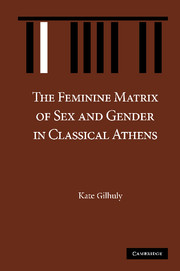Book contents
- Frontmatter
- Contents
- ACKNOWLEDGMENTS
- LIST OF ABBREVIATIONS
- 1 Introduction
- 2 Collapsing Order: Typologies of Women in the Speech “Against Neaira”
- 3 Why Is Diotima a Priestess? The Feminine Continuum in Plato's Symposium
- 4 Bringing the Polis Home: Private Performance and the Civic Gaze in Xenophon's Symposium
- 5 Sex and Sacrifice in Aristophanes' Lysistrata
- Conclusion
- BIBLIOGRAPHY
- INDEX LOCORUM
- SUBJECT INDEX
Conclusion
Published online by Cambridge University Press: 21 October 2009
- Frontmatter
- Contents
- ACKNOWLEDGMENTS
- LIST OF ABBREVIATIONS
- 1 Introduction
- 2 Collapsing Order: Typologies of Women in the Speech “Against Neaira”
- 3 Why Is Diotima a Priestess? The Feminine Continuum in Plato's Symposium
- 4 Bringing the Polis Home: Private Performance and the Civic Gaze in Xenophon's Symposium
- 5 Sex and Sacrifice in Aristophanes' Lysistrata
- Conclusion
- BIBLIOGRAPHY
- INDEX LOCORUM
- SUBJECT INDEX
Summary
Although I have focused only on a small collection of texts in this book, I hope that readers will recognize the interplay of the categories of prostitute, wife, and ritual agent elsewhere as well. By way of an epilogue, I would like to offer one more example in which these roles define the parameters for representing the feminine. In the story of Hypereides’ defense of Phryne, we find a beautiful and famous courtesan in the middle of the fourth century BCE who was accused of impiety because she allegedly reveled in the Lyceum, introduced a new divinity, and formed illicit thiasoi, or bands, of men and women. The tradition memorializing this case bears traces of being shaped by the discursive matrix that defines the prostitute against the wife, while assimilating her to the ritual agent. Athenaios preserves a fragment from Hermippos (ca. 200 BCE), who adapted a story from Idomeneus (ca. 300 BCE), describing the trial:
⋯δ⋯ Ὑπερείδης συναγορεύων τῇ Φρúνῃ ὡς οὐδ⋯ν
ἤνυε λέγων ⋯πίδοξοί τε ἧσαν οἱ δικαστα⋯
καταψηϕιούμενοι, παραγαγὼν αὐτ⋯ν εἰς τοὐμϕαν⋯ς
κα⋯ περιρρήξας τοὺς χιτωνίσκους γυμνά τε τά
στέρνα ποιήσας τοὺσ ⋯πιλογικοὺς οἲκτους ⋯κ τ⋯ς
ὂψεως αὐτ⋯ς ⋯περρητόρευσεν δεισιδαιμον⋯αί τε
⋯ποίησεν τοὺς δικαστ⋯σ κα⋯ ὑποϕ⋯τιν κα⋯ ζάκοπον
Ἀϕροδίτης ⋯λέῳ χαρισαμένους μ⋯ ⋯ποκτεῖναι.
Hypereides, while he was defending Phryne, since he was accomplishing nothing by speaking, and the judges were likely going to vote against her, he led her into the open, and ripping off her clothing he made her chest bare. He broke into an epilogue made piteous from the sight of her and caused the jurors to fear as a deity this interpreter and ministrant of Aphrodite, and, indulging their compassion, they did not put her to death.
(Hermippus F68=Athenaios 590e)- Type
- Chapter
- Information
- The Feminine Matrix of Sex and Gender in Classical Athens , pp. 180 - 188Publisher: Cambridge University PressPrint publication year: 2008



